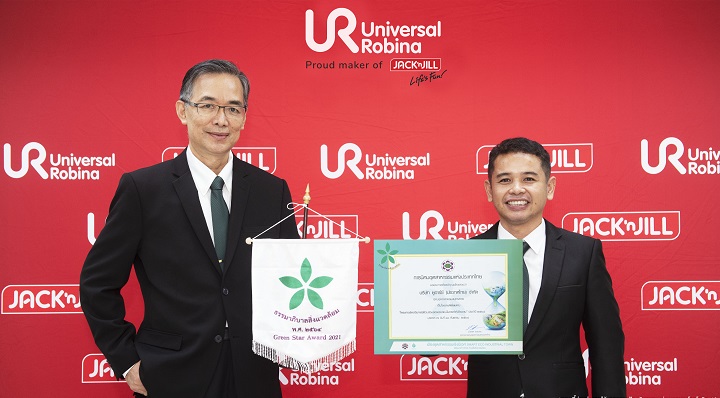Universal Robina Corp.’s (URC) subsidiary in Thailand has been recognized with the Good Environmental Governance Award 2021 for two of its facilities at the Samut Sakhon Industrial Estate, southwest of Bangkok.

“It’s an honor to be recognized for our excellent business conduct in all aspects of our operations,” said Tanant Suwanraks, general manager of URC Thailand.
“This award inspires us to strengthen our sustainability practices and ensure that we continue to meet good environmental governance standards,” he added.
The award, in recognition of two URC Thailand plants (4 and 6), was presented by Dr. Veeris Ammarapala, governor of the Industrial Estate Authority of Thailand.
In 2018, the company was awarded the same Good Environmental Governance Award for plants 1 and 3.
URC Thailand has been operating since 1992 and currently has five manufacturing facilities in the country. It produces some of Thailand’s top snacks under the Jack ‘n Jill brand such as Dewberry, Cream-O, Roller Coaster, Tivoli, Lausanne, Dynamite, Lush, and Fun-O, which was awarded as Thailand’s most admired biscuit brand in 2021.
URC Thailand’s two plants met criteria set by the Industrial Estate Authority of Thailand, including information accessibility and accuracy; community participation in problem-solving; transparency; social responsibility; rule of law legitimacy; justice principles and returning benefits to society; and community, as well as, factory sustainability and harmony.
“As we live up to our purpose of delighting Thai consumers with good food choices, we’ll strive to become more environmentally conscious and prioritize business conduct through our URGreen program,” said Suwanraks.
Last year, URC Thailand set goals for its “URGreen” program in line with the six sustainability focus areas of its mother company in the Philippines. URC has been actively spearheading projects to help improve people’s capabilities leading to better livelihood (People & Communities); to move towards a low-carbon economy (Climate Action); to improve water efficiency and protect watersheds (Water); to improve its product portfolio (Product); to reduce its packaging footprint (Packaging); and to promote responsible sourcing of key ingredients (Sourcing). These initiatives are in line with the United Nations Sustainability Developmental Goals.

